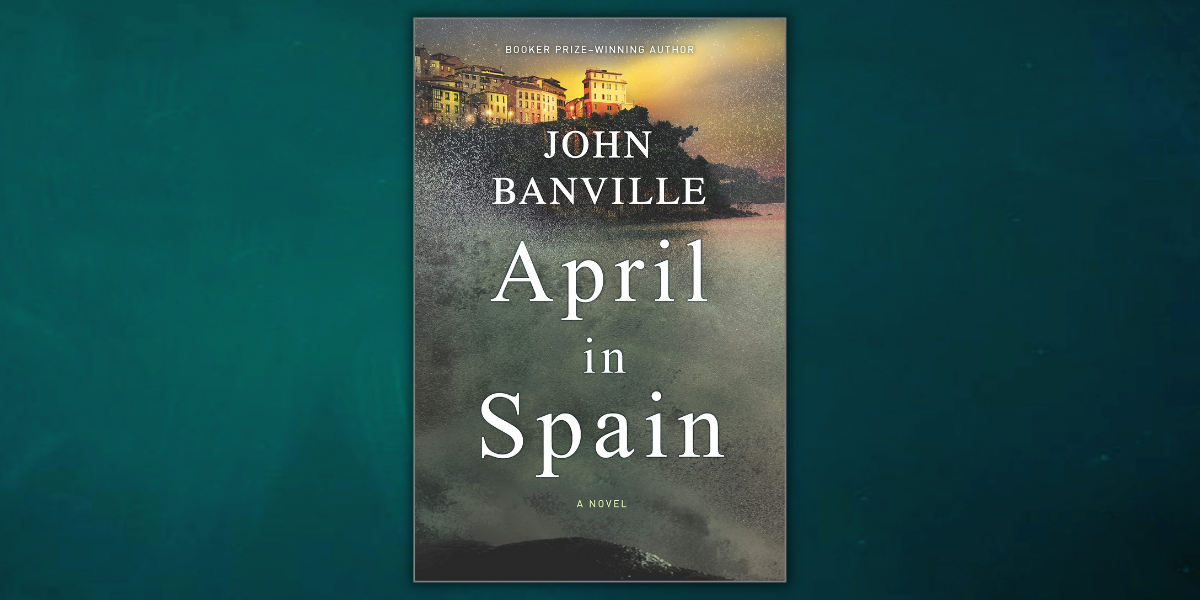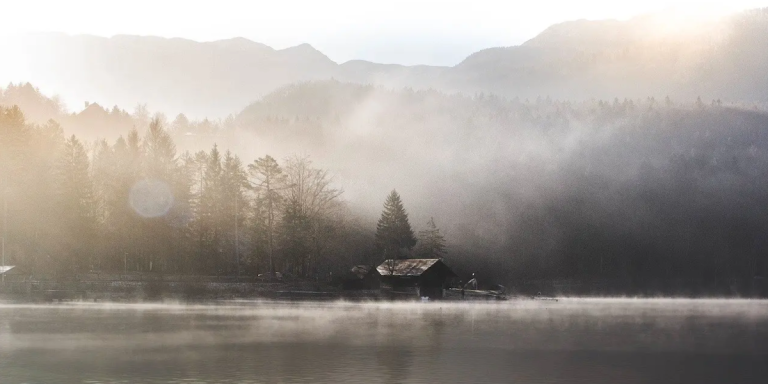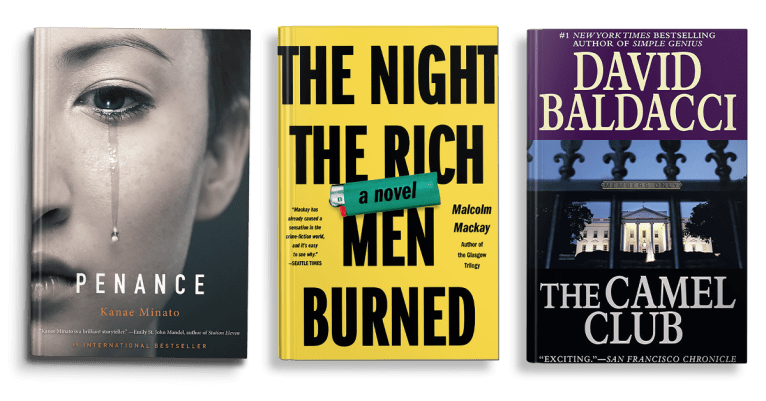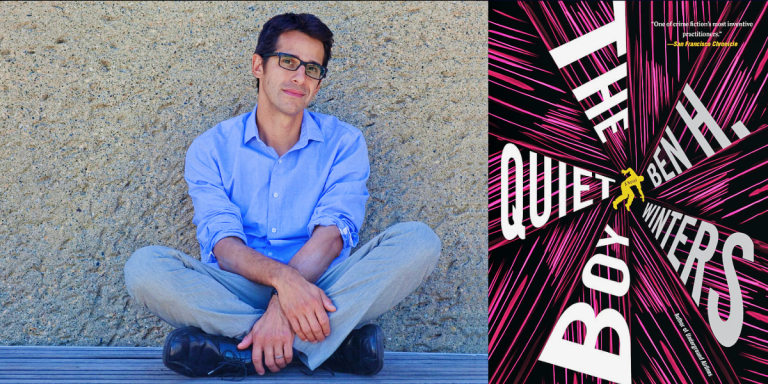Read the Excerpt: April in Spain by John Banville
 London
London
Terry Tice liked killing people. It was as simple as that.
Maybe “liked” wasn’t the right word. Nowadays he was paid to do it, and well paid. But money was never the motive, not really. Then what was? He had given a lot of thought to this question, on and off, over the years. He wasn’t a looney, and it wasn’t a sex thing, or anything sick like that—he was no psycho. The best answer he could come up with was that it was a matter of making things tidy, of putting things in their right place. The people he was hired to kill had got in the way of something, some project or other, and had to be removed in order for business to proceed smoothly. Either that, or they were superfluous, which was just as good a reason for them to be disposed of. Needless to say, he had nothing personal against any of his targets—which is how he thought of them, since “victim” would sound as if he was to blame—except insofar as they were clutter. Yes, it gave him a real sense of satisfaction to make things neat and shipshape.
“Shipshape,” that was the word. After all, he had been in the British navy, for a while, at the end of the war. He was too young to enlist, but he had lied about his age and was taken on, and “saw action,” as the fruity-voiced high-ups liked to say, hunting German submarines in the North Atlantic. Life at sea was boring, however, and boredom was one of the things Terry just couldn’t put up with. Besides, he was prone to seasickness. A sailor who was seasick all the time, that would be a fine thing. So as soon as the chance came, he got out and transferred to the army.
He served for a few months in North Africa, propped on his elbows in wadis, fighting off the flies and taking potshots at Rommel’s famous Afrika Korps whenever they put up their big square heads, while off on the horizon the tanks buzzed like beetles, spitting fire at each other day and night. After that he did a spell in Burma, where he got the chance to kill a lot of little yellow fellows, and had a fine old time.
In Africa, he had caught a nasty dose of the clap—though was there such a thing as a nice dose of the clap?—and in Burma he contracted an even nastier case of malaria. If it wasn’t one thing it was another. Life—a mug’s game.
The end of the war was a shock for Private Tice. In peacetime, he didn’t know what to do with himself, and drifted from place to place around London, and from job to job. He had no family, that he knew of—he had been brought up, or dragged up, more like, in an Irish orphanage—and didn’t keep in touch with his mates from the old days in the desert or on the ocean wave. There weren’t that many of them, anyway. None, in fact, if the truth were told.
For a while he had a serious go at the girls, but it wasn’t a success. Most of the ones he picked up turned out to be on the game—he must give off a particular scent or something, since the brassers fairly flocked to him; it was a thing he noticed. Of course, it was against his principles to pay for it, and anyway, it wasn’t much to write home about, in his opinion.
There was one who latched on to him who wasn’t a tart. She was a hot little redhead, halfway respectable—she had an office job in the Morris motor car factory up near Oxford, though she was cockney to the bone. He didn’t drive a car, himself, so he only saw her if he went up on the train, or when she came down to the Smoke the odd weekend for a bit of fun among the bright lights. Sapphire, she said her name was. Ooh-la-la. In the Dog and Bone one night he had a rummage in her handbag, just out of curiosity, while she was off powdering her nose, and came across an old ration book and found out her real name was Doris— Doris Huggett, from over Stepney way. That was the same night he realized, when he took a close look at it, that her hair was dyed. He should have known, it was that bright, with that fake metallic shine, like the shine on the curve of a brand-new Morris Oxford mudguard.
Doris-alias-Sapphire didn’t last much longer than any of the others. In a place in Soho on New Year’s Eve she had a couple of Babychams too many and turned away and spluttered with laughter at some remark he had made. He couldn’t see anything funny in what he’d said. Drunk though she was, he took her out the lane behind the club and gave her a few smacks to teach her manners. Next morning, she rang up screaming, and threatening to have him done for assault and battery, but nothing came of it. That was a thing he wouldn’t stand for, being disrespected and made fun of. He had just linked in with an East End outfit, and was doing some profitable robbing and the like. He had to get out, though, after knifing one of the younger blokes in the crew for mimicking his Irish accent—the Irish accent, it should
be said, that he hadn’t known he had, until then.
He was handy with a knife, and with shooters—he’d been in the army, after all—and was pretty nifty with his fists, too, when the need arose, even if he was a bantamweight. One of the Kray twins, Ronnie, it was, took him on for a while as an enforcer, but his low stature was against him. That was why he liked Burma, despite the heat and the fever and all the rest of it—the fellows he’d been sent to kill down there were his own size or smaller. It wasn’t easy making a living on Civvy Street, and he was getting desperate, he didn’t mind admitting it, when Percy
Antrobus came sashaying into his life.
Percy was—well, it was hard to say what Percy was, exactly. Heavy, pasty-faced, with a woman’s hips, and bruise-colored pouches under his eyes and a fat lower lip that sagged and turned a glistening shade of dark purple when he’d had a few. Brandy-and-port was his tipple, though he started the day with what he called a coupe, which as Terry discovered was just the French word for a glass of champagne. Percy took his champers ice-cold. He had a swizzle stick that was made of real gold. When Terry asked him what it was for, Percy looked at him in that way he did when he was pretending to be shocked, his eyes big and round as pennies and his mouth pursed into a crimped little circle that looked less like a mouth than a you-know-what, and said, “Dear boy, surely you wouldn’t think of drinking champagne before noon with bubbles in it?”
That was Percy.
And you had to give it to him, it was he who saw Terry’s potential, and introduced him to his true vocation.
Funny, the way it turned out, that his first paid-for target should be, of all people, Percy’s old ma. She had a few bob in the bank, quite a few, in fact, and was threatening to cut Percy out of her will, on account of something he’d done or hadn’t done. Percy, at his wits’ end, had decided the only thing for it was to have her done over before she had time to ring up her solicitor—a “complete stinker,” who had it in for Percy, according to the man himself—and order him to bring her the aforementioned document so she could strike from it the name of her only son, the said Percival.
Terry had come across Percy for the first time one foggy November night in the King’s Head in Putney. Afterward it occurred to him that it hadn’t been a chance encounter at all, and that Percy had picked him out deliberately, as a lad likely to help him in the matter of his inheritance. When, coming up to closing time, Percy started telling him about his problem with “the Mater”—he really did talk like that—and how he intended to go about solving it, Terry thought he was joking.
But it was no joke.
When they were saying good night outside the pub, their breath rising up in big dense puffs through the already dense pea-souper fog, Percy stuck two tenners into Terry’s breast pocket and suggested they meet in the same place at the same time the next night. Terry was in two minds whether to go, but go he did. When Percy saw him coming in the door he gave him a big smile, and treated him to a pint of pale and a dish of jellied eels, and whispered in his ear that he’d pay him a hundred pounds sterling to put a bullet in the old girl’s noggin.
A hundred quid! Terry had never expected to see that much money all in the one fist.
Two days later he shot Mrs. Antrobus in Kensington High Street, in broad daylight, grabbing her bag to make it look like a common or garden snatch job done by some panicky kid. Percy had supplied the pistol—“Absolutely untraceable, laddie, I assure you”—and arranged for it to be got rid of afterward. This was how Terry discovered just how well connected the fat old poofter was. Untraceable heaters didn’t grow on trees.
Next morning the papers ran a big story on the old girl’s death, accompanied by “an artist’s impression” of “the brutal killer.” Terrible likeness.
A few days after the funeral, Terry was treated by his new friend to a slap-up lunch at the Ritz. Terry was uneasy about them being seen together in such a public place, especially after the sudden demise of “the Mater,” but Percy gave him a slow wink and said it was all right, that he often came here with “handsome young chaps such as yourself.”
When lunch was over, Terry’s head was spinning from the wine and the stink of the cigars that Percy smoked, which he did even during the meal. They ambled down St. James’s Street and dropped into the premises of John Lobb, Bootmaker. There Terry was measured for a pair of brogues—he would have preferred something sharper, but when he took delivery of the shoes a couple of weeks later and tried them on, he felt like a lord. He managed to get a look at the bill, and was glad it was on Percy’s account. Percy also bought him a dark-gray titfer at Locks the Hatters, just a few doors up from Lobb’s.
“A young man in your line of work can’t afford to look the part,” Percy said, in his plummy, chairman-of-the-board voice, and sniggered. It took Terry a second or two to get the twist of it. Wit, that was.
“What line of work would that be, exactly, Mr. Antrobus?” Terry inquired, putting on the innocent act.
And Percy only smiled, and tried to pinch young Terry’s neat little backside.
Terry still wore the Lobb shoes on occasion, especially when he was missing Percy, although that wasn’t very often. They had aged nicely, the brogues, and fitted more snugly with each wearing. The gray hat had got badly rained on—at the races at Ascot, as it happened, to which top-hatted Percy had taken him, for a special treat—but Terry didn’t mind as he had never got the hang of wearing it. He thought it made him look like a spiv, not the gentleman Percy had meant to turn him into. Poor old Percy.
He’d had to go, Percy did, in the end, eyes wide with surprise and his mouth shaped into that little puckered pink hole. Went down with a bump and a muffled rumble, like a sack of potatoes.
DONOSTIA
There was a narrow entrance to the bay, so that the water, once inside, fanned out in the shape of an enormous seashell. In fact, the bay was named La Concha, the Spanish word for shell. Because of that bottleneck channel and the long curve of the beach, the waves didn’t run along at a bias, as they did on beaches at home. Instead, there was just one immensely long wave that broke with a single, muffled crash, from the point of the Old Town over to the right, all the way along to the headland far off on the left, where there was a funicular railway that, all day long, inched its laborious way up and down the side of a hill. When Quirke woke at night, with the window open beside the bed, it was as if there were a big, friendly animal asleep
and softly breathing out there in the darkness.
All this fascinated him, and he spent a lot of time sitting in front of the window just looking out at the view, his mind a blank. “You look at the sea as other men would look at a woman,” his wife said with amusement.
It was she, Evelyn, who had suggested San Sebastián, and before he could think up a convincing objection, she had written off for a brochure to the Hotel de Londres y de Inglaterra. “Honestly,” he scoffed, “the names they give to these establishments!” Evelyn ignored him. But when he saw the place he had to admit it was impressive, sitting smack in the middle of the seafront facing the bay, a solid, handsome edifice.
“That’s ‘the London and England Hotel,’ right?” he said, reading the name on the brochure. “Why can’t we stay at a Spanish one?”
“It is Spanish, as you very well know,” his wife replied. “It’s the finest hotel in the city. I stayed there once, when the war was on. It was very good. I’m sure it still is.”
“Look at the prices,” he grumbled. He knew better than to ask how she had come to be in San Sebastián in wartime. Questions like that were verboten. “And this is not even the high season,” he added.
It was spring, she said, the best season of all, and they were going to Spain on a holiday, even if she had to handcuff him and push him up the steps and on to the airplane.
“Northern Spain is southern Ireland,” she said. “It rains all the time, everywhere is green and everyone is Catholic. You will love it.”
“Will they have Irish wine?” “Ha ha. You are so funny.”
She turned away and he smacked her on the bottom, with just enough force to make it wobble in the wonderful way that it did. Strange, he thought, that the same passion was still there between them, the same erotic thrill. It should have been embarrassing, but it wasn’t. They were middle-aged, they had made a late marriage—a second one for both of them—and, so far, they still couldn’t get enough of each other. It was absurd, he would say, and “Oh, ja, ja, ziss is zertainly zo!” Evelyn would agree, putting on her exaggerated Herr Doktor Freud accent to make him laugh, while at the same time guiding his hands on to her broad, uncorseted, wobbly bum, and kissing him on the lips in that light, peculiarly chaste fashion that never failed to set his blood sizzling.
It was a mystery to him that not only had she married him, but had stuck with him, too, and showed no signs of letting go. Her steadfastness was the very thing that made him nervous, however, and sometimes, in the early morning especially, he would rear up in a panic to check that she was there beside him in bed, that she hadn’t given up on the whole project and slipped away in the night. But no, there she was, his large, soft-eyed, mystifying wife, as loving and lightsome as ever, in her always slightly amused, slightly distracted way.
His wife. He, Quirke, had a wife. Yes, the notion of it never failed to surprise him. He had been married before, but never like this; no, never like this.
And now here they were, in Spain, on holiday.
She had been right about the weather—it was raining when they arrived. She didn’t care, and neither, really, did he, though he wouldn’t say so.
About the greenness of the place she was also right, and about the Catholicism—there was a sense of staid piety that could have been Irish. It certainly wasn’t the Spain that old Spanish hands wrote about, with scorching dust, and hot-eyed señoritas stamping the low square heels of their clunky black shoes, and hidalgos—was that the word?—in skintight trousers fighting each other with knives, and everybody shouting Viva España! and No pasarán! and plunging swords between the shoulder blades of lumbering, bloodied and bewildered bulls.
All the same, however much the place might seem like home, Quirke still resented being on holiday. It was like, he said, being in a drying-out hospital. He had been in more than one such place, in his day, and knew what he was talking about.
“You love to be miserable,” Evelyn told him, giving one of her soft, low laughs. “It’s your version of being happy.”
His wife was a professional psychiatrist, and regarded his many fears and phobias with benign amusement. Most of what he claimed to be the matter with him she diagnosed as playacting, or “performative defense,” as she put it—a barrier erected by an overgrown child against a world that, despite his distrust of it, meant him no harm.
“The world treats us all equally,” she said. “Mistreats, you mean,” he countered darkly.
She had once compared him to Eeyore, but since he had never heard of Pooh’s mournful friend—A. A. Milne was not an author who would have figured in Quirke’s blighted childhood— the gibe fell flat.
“You have no problems,” she would say gaily. “You have me, instead.” Then he would smack her on the backside again, hard, and she would turn and shimmy into his arms and bite him on the earlobe, just as hard.
3
You know that place name we keep seeing around here,
Donostia?” Quirke said. “Well, that’s what San Sebastián is called in Basque.”
“Or San Sebastián is what Donostia is called in Spanish,” his wife responded.
She always managed to have the last word. He could never understand how she did it. Maybe she didn’t mean to? Certainly, she didn’t do it out of willfulness—she was the least willful person he had ever known—or to get one over on him. She was simply putting the finishing touch to an exchange, he supposed, as she would put down a full stop at the end of a sentence.
It was the morning of the second day of their stay at the Londres. They were in the bedroom of their suite—there was a small reception room as well—and he was sitting on the side of the disordered bed, by the open window, drinking an absurdly tiny cup of coffee and gazing out across the seafront to the beach and the glittering sea beyond. His head felt empty. He supposed this must be what people meant by relaxation. He didn’t go in for it much, himself. In the normal run of things he thought of himself as standing on the edge of a precipice and having a hard time not letting go. Or that was how it used to be, until Evelyn came quietly up behind him and put her hands on his shoulders and drew him back from the brink and into her embrace.
What if one day she were to let go her hold? The thought made him shut his eyes tight, like a child in the night choosing inner darkness against the darker dark all around.
The coffee was so bitter that every time he took a sip of it the insides of his cheeks contracted until they almost met.
Outside, the rain had stopped, and the sky was clearing and the sun was making a determined effort to shine. A few tourists, with their towels and swimming caps and paperback books, had ventured onto the still damp beach. The sand was the color of a sucked caramel sweet, and as shinily smooth. He seemed to remember reading somewhere that the Playa de la Concha wasn’t a real beach, that the sand was brought here from somewhere else by the lorryload each year before the start of the tourist season. Could it be true? Certainly from up here the stuff did look suspiciously fine and unblemished, with not a stone or seashell to be seen. At night, when the tide was out, people came and wrote elaborate slogans on it, in a strange, cursive lettering that neither he nor Evelyn could decipher. Some antique Basque script, perhaps, Evelyn suggested.
It was easy to tell the visitors by the pallor of their skin and
the tentative way they went about choosing a place on the beach on which to settle themselves. Quirke said they reminded him of a dog looking for a spot in which to do its business, and Evelyn frowned and clicked her tongue reprovingly.
For the bathers and the sun worshippers, there was also the tricky matter of how to get into their swimsuits. Officers of the Guardia Civil, in their operetta uniforms, regularly patrolled the promenade, to make sure that no one, especially not a woman, was showing more than the minimum of bare skin. Since there was no official definition of what was and was not permitted in the way of undress, people could never be sure that they wouldn’t suddenly be growled at in that particular, guttural tone the Guardia adopted when addressing tourists. Though Quirke noticed that the ones who spoke the most politely were the ones who sounded the most menacing.
Behind him in the room Evelyn gave a small exclamation of shock. She was reading a Spanish newspaper. He turned to her with a questioning eye.
“General Franco has refused an appeal by the Pope to spare the lives of two Basque nationalists,” she said. “They will be garrotted tomorrow at dawn. Garrotted! How can such a monster still be in power?”
“Better keep that kind of question to yourself, my dear,” he said mildly, “even here in Basqueland, where they loathe the strutting little brute.”
It was lunchtime. Quirke had already noted that no matter how the hours dragged, somehow, inexplicably, it always seemed to be just about time for lunch, or for an afternoon glass of wine, for an aperitif, for dinner. He complained about this to his wife—“I feel like a baby in an incubator”—as he complained to her of so many things. She pretended not to hear.
He noticed he was drinking less down here, or less, anyway, than he would have in similar circumstances at home. But could there ever be, at home, circumstances similar to these? Maybe, he thought, the way of life here, the slow mornings, the softness of the slightly damp, lacquered air, the general yieldingness of things—maybe it would bring about a transformation in his character, make a new man of him. He laughed to himself. Fat chance.
Already this morning he had made a fool of himself by mentioning something about the quality of the Mediterranean light. “But we’re on the Atlantic,” Evelyn said. “Didn’t you know
that?”
Of course he knew it. He had studied the map of the Iberian Peninsula in the airline magazine on the flight coming down here, trying to take his mind off the rain clouds through which the frighteningly delicate airplane—an aluminum tube with wings—was making its turbulent way. How could he have forgotten what coast they were on?
He turned his eyes again to the beach and the poor shivering wraiths scattered about the sand. Shaky as he might be in matters of geography, at least he knew better than to bare his blue-gray shanks to the chill spring breeze skimming to shore over the crests of those rolling Atlantic breakers.
There were a few Spaniards among the people on the beach, male, for the most part, easily identifiable by their glistening, mahogany-hued pelts. They were on the prowl after the buttermilk-pale northern girls, new flocks of whom came down on charter flights every week. The would-be Don Juans seemed not to care whether the girls were good-looking or not— paleness was all, the paleness of thick, pulpy flesh that hadn’t seen the sun since last year’s package trip to the suntanned south. He drained the last bitter dregs of the coffee and put the cup aside, feeling as if he had dosed himself with an emetic. He would have preferred tea, but in Spain only the English could
order tea without self-consciousness.
With an effort he stirred himself out of his torpor, and went into the bathroom, with its unfamiliar appurtenances. Part of his dislike of holidays was that they required him to stay in hotels. He returned to the bedroom, hitching up his pajamas. He told himself he should do something about his paunch, though he knew he wouldn’t.
How was it, he wondered, not for the first time, that people seemed oblivious to the brazen confidence trick that was played on them in hotels? Did it never occur to them to think how many greasy holidaymakers, leaky honeymooners, how many oldsters with unpredictable bladders and flaking skin, had slept already in the very bed in which they were themselves just now reclining? Did it never cross their minds that over the years God knows how many poor souls had breathed their last on the same mattress on which they stretched themselves out so luxuriously at the end of another fun-filled day spent prone on the stoneless beach or gamboling in the sea as blue as Reckitt’s dye?
The conspiracy begins the moment you arrive, as he pointed out to Evelyn, who was knitting, and wasn’t listening. There’s the grinning doorman who yanks open the door of your taxi and gabbles a greeting in pidgin English. There’s the beaming girl in black behind the reception desk who exclaims, in her bouncy way, that it is a pleasure to welcome you back, even though you’ve never stayed here before. There is the porter, lean and stooped, with a melancholy eye and a mustache that might have been drawn on with an eyebrow pencil, who festoons himself with your suitcases and staggers away with them, to arrive at the door of your room a mysterious twenty minutes later—was he off in some cubbyhole in the meantime, going through your things?—and, having shown you how the light switches work and how to open and close the curtains, loiters expectantly on the threshold, with his fake, ingratiating smile, waiting for his tip.
“And why,” he called out whiningly, Evelyn having taken
his place in the bathroom, “why must there be so many staff?” They were everywhere: porters, receptionists, waiters, barmen, chambermaids, bellboys, cleaners and those unaccountable, bossy-looking, middle-aged women in white blouses and black skirts who stride along the upstairs corridors bearing in their chubby hands those mysterious but important-looking clipboards.
Evelyn came back into the bedroom.
“Why did you bring this woolen jumper?” she asked, holding up the heavy brown garment by the sleeves. “We are in Spain, not Scandinavia.” She paused, and looked at him vaguely. “What were you saying, dear, about hotels?”
When they were first married, Quirke would divert himself by seeing how far he could push her before she lost her temper. She never did. She responded to everything, all his taunts and teases, without the least sign of anger or annoyance, but with what was no more than a kind of clinical interest. It was, he supposed, another way of having the last word, only more so.
Despite everything, and though he wouldn’t dream of admitting it to Evelyn, he had come to quite like the Londres. It was discreetly self-confident, with an understated style. It didn’t nag, but left him largely to his own devices. The restaurant was good, the bar well stocked. He was even acquiring a taste for the briny olives, a fresh dish of which was served with every drink he ordered.
His keenest, secret enthusiasm was the lift. It ran, or joggled, rather, up and down through the very heart of the building. It was ancient and creaky, with a folding iron gate that shuddered shut with a satisfying clatter. Inside, it was lined with red plush, and attached to the back wall, below a framed mirror, was a little wooden seat hardly deeper than a bookshelf, covered with a raggedy piece of carpet held in place by round-headed nails worn to a shine over the years by the well-upholstered posteriors of countless well-heeled guests.
At the right when you were facing out, there was a brass wheel, about a foot in diameter, with an invitingly fat brass knob fitted to the rim. It reminded Quirke of the wheel at the back of those fire engines you see in films, that firemen spin with such amazing speed when they’re unwinding hosepipes in the glare of a burning building. Every time his eye fell on it, he had a childish urge to grasp the brass knob and give the wheel a turn or two, just to see what would happen. But he lacked the courage. In some ways, Quirke was a timid man.
Yes, he liked the Londres. He was pleased to be here, there was no denying it. This, of course, made him uneasy. What of his long-worked-at reputation as a malcontent and moaner?
Order the Book
Don't disturb the dead…
On the idyllic coast of San Sebastian, Spain, Dublin pathologist Quirke is struggling to relax, despite the beaches, cafés and the company of his disarmingly lovely wife. When he glimpses a familiar face in the twilight at Las Acadas bar, it's hard at first to tell whether his imagination is just running away with him.
Because this young woman can't be April Latimer. She was murdered by her brother, years ago—the conclusion to an unspeakable scandal that shook one of Ireland's foremost political dynasties.
Unable to ignore his instincts, Quirke makes a call back home to Ireland and soon Detective St. John Strafford is dispatched to Spain. But he's not the only one en route. A relentless hit man is on the hunt for his latest prey, and the next victim might be Quirke himself.
By clicking 'Sign Up,' I acknowledge that I have read and agree to Hachette Book Group’s Privacy Policy and Terms of Use
What to Read Next





